French ambassador to return to Australia
France will send its ambassador back to Canberra to “redefine the relationship” with Australia amid the fallout over the AUKUS nuclear sub deal.
World
Don't miss out on the headlines from World. Followed categories will be added to My News.
France will send its ambassador back to Australia, ending a diplomatic protest over Canberra’s decision to scrap a contract to buy French submarines.
France recalled its envoy to Australia on September 17, but Foreign Minister Jean-Yves Le Drian told parliament he had “now asked our ambassador to return to Canberra with two objectives: helping to define our relationship with Australia in the future … and firmly defend our interests in the implementation of Australia’s decision to terminate the submarine program”.
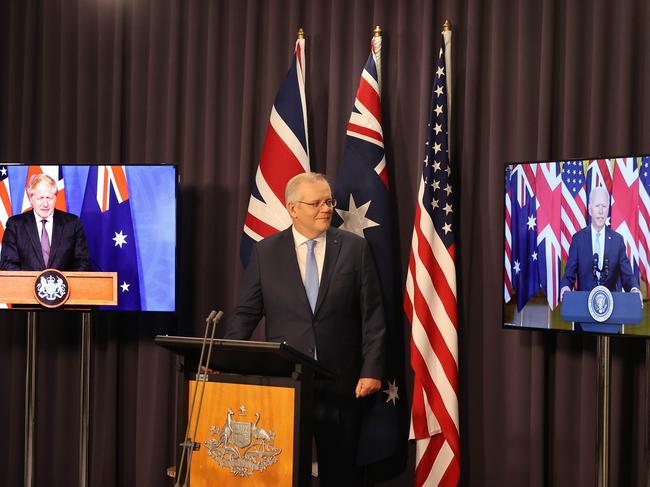
President Emmanuel Macron reacted furiously to Australia’s announcement on September 15 that it was scrapping its multibillion-dollar submarine contract with France in favour of a new deal negotiated in secret with the US and Britain, referred to as AUKUS.
French Foreign Minister Jean-Yves Le Drian accused Australia of back-stabbing and the United States of betrayal, calling the move reminiscent of the unilateralist attitude of Biden’s predecessor Donald Trump.
Paris recalled its envoys to both Australia and the United States over the furore.
But Macron later ordered the French ambassador to Washington to return to his post after a call with US President Joe Biden, which helped soothe tensions.
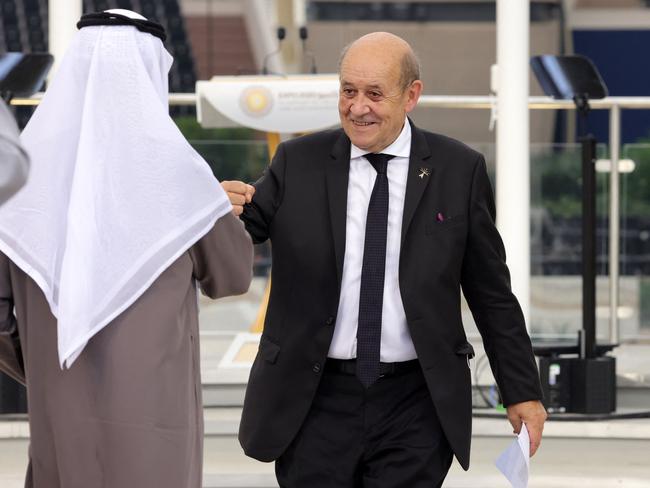
France however made clear it was not in as big a rush to mend fences with Australia, and kept its envoy to Canberra in Paris.
France’s anger stemmed not only from the loss of the submarine deal — worth A$50 billion (31 billion euros, $36.5 billion) in 2016 — but also the shattering of an alliance with Australia that it saw as a cornerstone of its Indo-Pacific security strategy.
SUBMARINE SCORE WINS OVER VOTERS
Australia’s decision to buy nuclear-powered submarines from the United States has won the backing of the majority of voters, amid concerns that China poses a national security threat to the country.
According to a Newspoll for The Australian, 59 per cent of voters supported the historic nuclear submarine project.
Of those polled 75 per cent also believe China posed a significant threat to Australia’s national security, while 46 per cent believe the AUKUS pact will make Australia safer and 29 per cent believe it will make no difference.
The majority also believed that the defence pact with the US and UK announced two weeks ago by Scott Morrison would make Australia safer in the midst of increasing strategic tensions in the region.
Mr Morrison’s approval ratings also showed signs of improvement after a week of summits in the US, with a two-point rise to 48 per cent among those satisfied with his performance as leader.
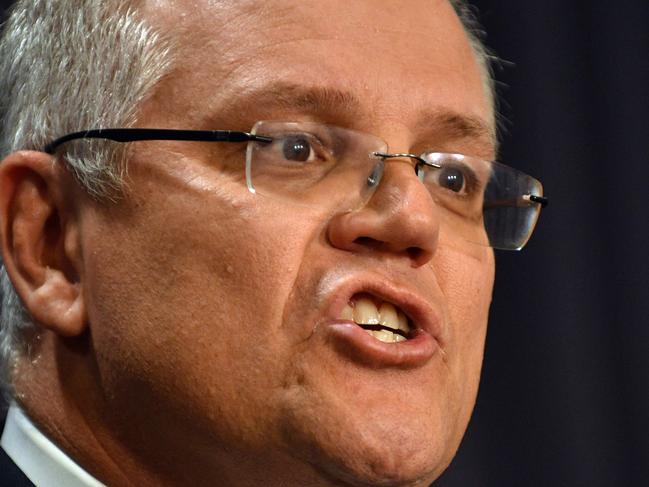
It comes as France said it is in no hurry to mend ties with Canberra as it weighs up whether to extract a cost for its ally’s “betrayal”, more than two weeks after the shock scrapping of a submarine contract with Australia,
Former Australian leader Malcolm Turnbull said on 29 September his successor “deliberately deceived” France when he scrapped the multi-billion-euro submarine deal with Paris in favour of nuclear-powered US or British alternatives.
France recalled its ambassador to Canberra to protest the 15 September announcement by Australia that it was scrapping the multibillion-dollar submarine contract with France in favour of a new deal negotiated in secret with the US and Britain.
The envoy is still in Paris, with no date set for his return, in a diplomatic snub intended to underline French outrage over the new AUKUS security pact between Canberra, Washington and London.
French leader Emmanuel Macron has also declined requests for a call from Australian Prime Minister Scott Morrison who wants to clear the air.
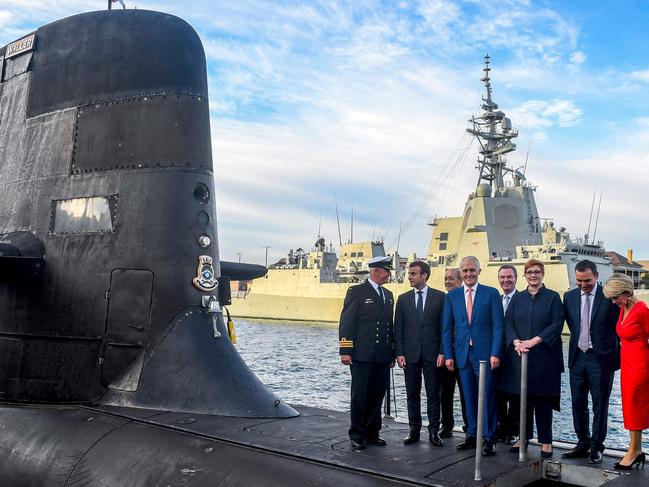
By contrast, the French ambassador to the United States, who was withdrawn at the same time in protest by Paris, has already returned to Washington and Mr Macron spoke to US President Joe Biden on 22 September.
“We need to have a conversation of substance” with Australia, an aide to the French leader said last week on condition of anonymity, adding that the conversation would take place “at an appropriate time.”
The exchange would be organised only once ambassador Jean-Pierre Thebault returns to Canberra “with a message from France that will set out a framework for our exchanges with Prime Minister Morrison.”
Mr Morrison, who was a guest of Mr Macron’s in the French capital in June, has acknowledged that he will need to be “patient”, adding: “We understand their disappointment.” Australian Trade Minister Dan Tehan is due in Paris next week, but his French counterpart Frank Riester has declined to meet him, a source close to the French Minister said.
France’s anger stems not only from the loss of the submarine deal – worth $A50 billion (31 billion euros) in 2016 – but also the shattering of an alliance that it saw as a cornerstone of its Indo-Pacific security strategy.
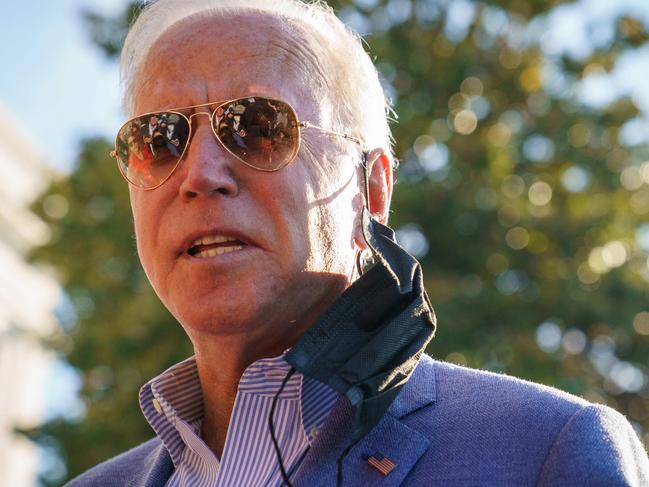
So far, Paris has reacted differently to each of the three English-speaking countries involved in AUKUS which will see US-designed nuclear submarines replace diesel-powered French ones.
Following their call, Mr Macron and Mr Biden said they would meet in person later this month, while US Secretary of State Antony Blinken arrives in Paris on Monday to build bridges.
France never withdrew its ambassador from London, and British Prime Minister Boris Johnson and Mr Macron spoke last week.
“It’s a stronger protest (against Australia) because in some ways we can allow ourselves to do it,” Bruno Tertrais from the Foundation for Strategic Research, a Paris-based think-tank, told AFP.
“Australia is a friendly country, but we don’t have as deep relations with her as with Britain and the United States. In other words, it’s easier and less costly to freeze official relations with Canberra than it would have been with London or Washington.”
FRANCE’S POSSIBLE PENALTY AGAINST AUSTRALIA
Beyond diplomatic posturing, one area where France could extract a cost is in talks over a new trade deal between the European Union and Australia.
The European Union is Australia’s third-biggest trading partner and the two sides had hoped to reach a deal before the end of the year.
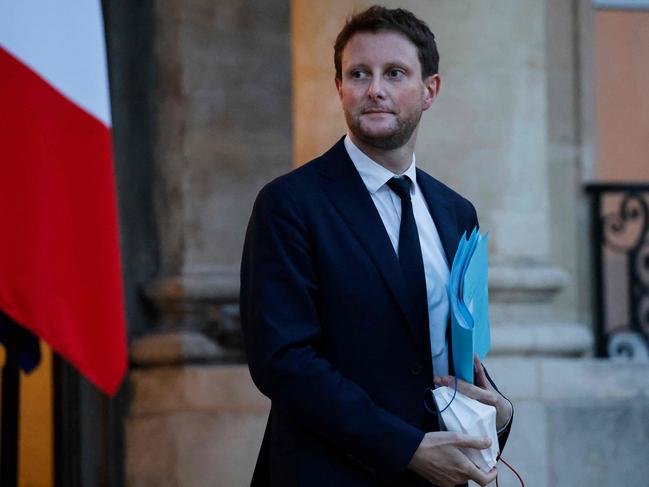
“I don’t see how we can have confidence in our Australian partner,” French Europe Minister Clement Beaune said in the aftermath of the announcement of AUKUS, raising the prospect of France scuttling any advances.
On Friday, a long-planned round of talks was postponed by a month. “If there are any retaliatory measures, they will be limited,” said Mr Tertrais who was sceptical that France was alone in pushing for the trade talks to be delayed.
“I don’t think France is in a state of mind of wanting to punish Australia.”
He expects that joint military operations, a feature of the once blossoming relations, will resume in due course, as well as contacts between the governments, who share common security concerns about China.
In France, some commentators have reached for rugby metaphors to describe the impact of the loss of submarine – and the recovery time needed by Paris.
“We got an Australian punch, an American late-tackle and a British eye-gouging,” said Senator Philippe Folliot during a hearing in the upper house this week.
Read related topics:AUKUS




